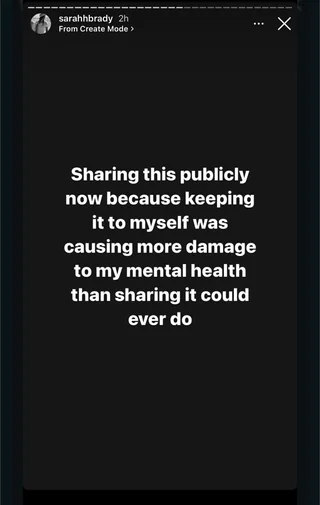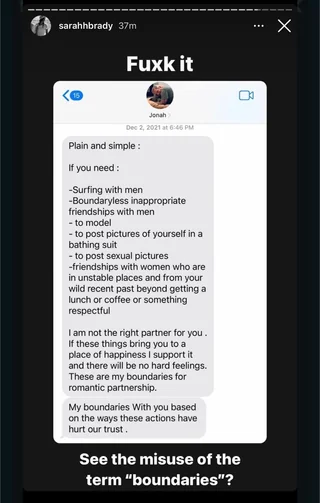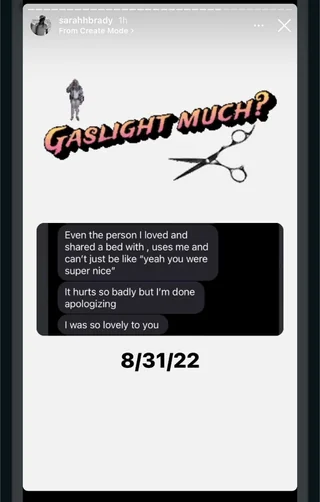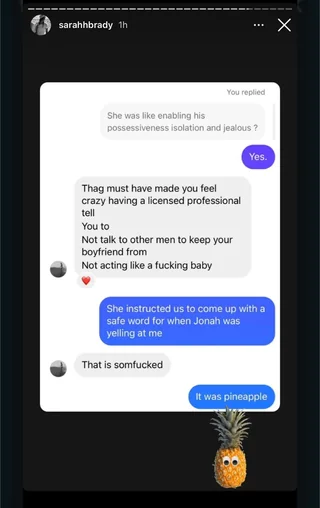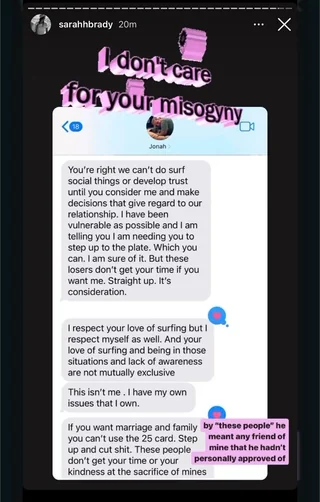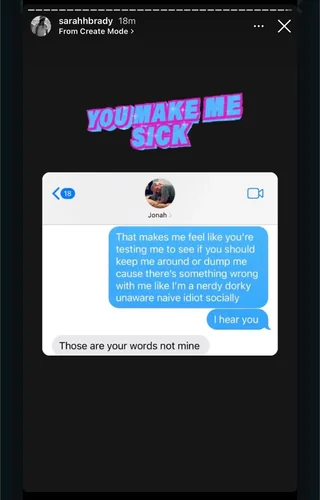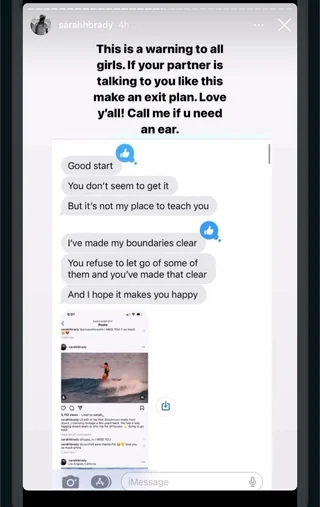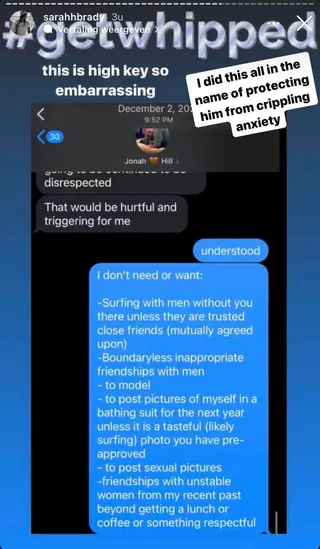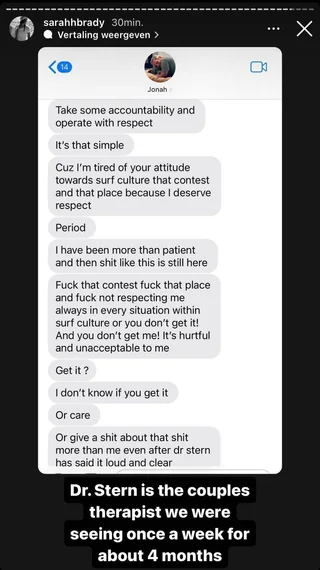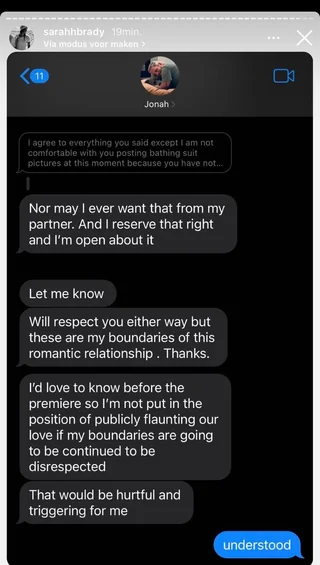So, if you’re following pop culture news lately, which I suppose you know I am now, you’ve probably heard about the scandalous text situation wherein Sarah Brady, actor Jonah Hill’s ex-girlfriend, released some texts they’d allegedly exchanged that don’t necessarily paint him in a great light. Let’s see.
Sarah recently posted the following series of photos of texts to her instagram story —
This story became controversial not only because of Sarah’s labelling Jonah’s behavior as emotional abuse, but also due to the alleged texts having Jonah’s usage of words like “boundaries” be misused in context.
The reason I’m writing here, and the reason I’ve heard about this story and had several conversations about it over the past week, are because Jonah in his alleged texting uses “therapy speak” words like “boundaries” in a context that is rife for miscommunication. It seems that as more folks become familiar with therapy stuff, whether it’s because they’re attending therapy themselves or because of the rise of therapy stuff on social media platforms, the more the verbiage of therapy bleeds out into real-life usage: and, just like other words that enter the public vernacular (looking at you, “I’m so bipolar,” and “I’m so OCD,”) they are often misused, misconstrued for the speaker’s own purposes, or misunderstood.
I recently had a conversation with a friend where a relationship of hers ended abruptly, and her friend provided little reasoning, ghosting the friendship leaving my peer with little recourse, and when questioned on it, briefly only responded by discussing their “journey of self-discovery.” The same sentiments are echoed in this Bustle article I recently read, “Is Therapy-Speak Making Us Selfish?” by Rebecca Fishbein. In this article, the author recounts ways in which “therapy speak” is on the rise, and ways in which it can impact relationships, arguing that tact is perhaps an important practice that gets left by the wayside when folks pursue their journeys of self-care and self-discovery.
All of this is quite understandable, and as a therapist, understandably frustrating. At once, I feel both glad that therapy, self-care and emotional intelligence is becoming increasingly important and understandable, and also understandably worried about folks using therapy terms and ideas absent the guidance of a licensed professional or support network.
That said, what can be learned from the series of text messages above? Many things of course, but here I am considering that it’s important for us to understand words and concepts given to us by therapy and popular culture and understand them a bit more before putting them into practice. If a person is going to tell a person what to do or wear or post and label that as a personal boundary of theirs, they lose the fact that a boundary refers to one’s own behaviors or what they themselves will allow or accept, rather than prescribing behavior for another individual.
In therapy, my boundary is that I end the session on time so I can get to my next appointment and respect folks’ time. My boundary is not that you arrive on time. That is a request I make, or a gauge of the mutual respect that we hold for one another, but not something I control.
A boundary I have is that I don’t want to date someone who doesn’t like to cook with me. I can’t control whether someone cooks with me or not. I can only choose well enough for myself to date folks I am compatible with, and not use my own words, preferences, or therapy-speak to wheedle someone into doing something I want against their will. Feel me?
The texts above were labeled as “controlling” or “manipulative” by many because the texter used words that sound like they mean well, and sound evidenced, and sound backed up by therapy, in order to convince a person that the things they were doing should change as a matter of “respect.” Just like someone can be like “Haha I am just so OCD because I like my bookcase organized” does not mean that they have any clue what a clinical diagnosis of obsessive-compulsive disorder entails, in the same way someone who is like, “The weather is so bipolar today,” is not offering a clinical diagnosis of the clouds. That said, in current society where the lexicon is rapidly adapting to include terms like “self-care” and “boundaries” and “gaslighting” and “narcissist” and “trauma” into everyday speech, some stuff gets lost in translation that is likely well-meant but not well-communicated.
As referenced in the Bustle article,
Lucy*, 29 and from Kentucky, had a friend who repeatedly insisted on dictating meetups in the name of self-care. “When we would make plans, they would change them the day before,” she says. “Trying to reschedule and rearrange events would be met with ‘The plan has changed. We’re going to do [alternative activity]. I’m setting a boundary.’”
Again, another misuse of the word “boundary,” which confuses readers and lessens the power of the word “boundary” in its legitimacy. Ultimately, such communication can harm relationships, as in the culture of “now” which includes fears of social missteps, icing, ghosting, and ultimately being “canceled,” folks might feel as though they are walking on eggshells when a peer seemingly pulls a “trump card” by using therapy-speak or referring back to mental health and boundaries, to which the receiver has little recourse. And again, while of course I think (irl) mental health, boundaries, and therapy are absolutely important, misappropriating them in communication can be damaging: to our points we are trying to get across, to our relationships, and ultimately to ourselves as we might unnecessarily strain relationships through miscommunication.
While not a panacea, an argument can be made to use tact and empathy in communication, something I often encourage my clients to stop and consider. And, most of the time, this comes at no cost to the communicator: sure, I can end a relationship with “I’ve determined I need to set a boundary because you are toxic,” or begin a conversation by “We need to talk.” But, I can also do so with some more tact, care, and consideration for the listener, with a “I’d like to end this relationship as it’s not working for either of us anymore,” or “Are you free at 7 tonight for a conversation about how I’d like to try couple’s counseling?” And what do I sacrifice? Not much, truth be told. Maybe some time to find the right words, but certainly not authenticity, and certainly not myself in the process.
While I dislike “people pleasing” (another buzzword) as much as the next therapist, it costs zero dollars to take just a bit of time to zoom out and communicate with some more tact on top of authenticity. While it may feel good and empowering to be brief and “set a boundary,” it may also help us out in the long-term to put just a little more tactful thought into nourishing our friendships and social connections, even if we feel they’re on the way out. It’s a helpful practice to integrate into our lives. And, it’s good to leave the therapy-talk in therapy, sometimes.

I understand “setting boundaries” is important, and “self care” too, and learning what you want and embodying that (hey, finding yourself, and being that, anyone??). And, at the same time, you can do that while attending to those in your life and tactfully communicating, when the time is right. There are certainly folks in my life who, if they are like, “Sara, should I entertain this conversation? You said I should be tactful, right?” I would give an all caps HELL NO to and say yeah, don’t communicate with that person who really hurt you and is too abusive to the point where their offering empathy is a foregone conclusion.
We can be decisive with our vulnerability. And yeah, that’s setting a boundary for oneself (“I will leave the conversation if Dad brings up his anxiety about money again during the holidays”) NOT prescribing behaviors for others or an attempt for control (“Mom really needs to apologize to me,”) which we have no control over — we only have control over us, babes. You can choose not to accept that mom did not apologize and moderate your behavior and presence accordingly.
The reality is, we are all just humans kind of stumbling through life, some worse for wear, some a bit more prepared, some changing quickly, others not so much. And, to try and paint stuff in pallid black-and-white good-or-bad loses a lot of the gray. We all are existing in a time like, for all of human existence, the language is changing and adapting to reflect current trends, and “Therapy Speak” Has Invaded All Our Relationships, as this aptly-named article purports. That said, if we have the ability to do so, continuing to offer space to our relationships for tact and understanding can be game-changers.
I try this practice all the time, imperfectly of course, if you couldn’t tell: why yes, I try to use the right terms, to be clinical and educational in the therapy room, but I also try to still be a human, and communicate in a way that feels warm and inviting in addition to therapeutic and science-y.
Mean what you say, and say what you mean. Consider yourself, and consider your listener. It may be more likely to yield that result you’d like for your relationships. And if not, blah blah something about synergy.
For your further consideration and listening pleasure —
